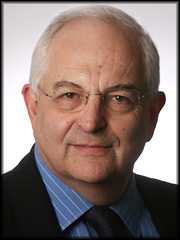Related Topics
Whither, Federal Reserve? (2)After Our Crash
Whither, Federal Reserve? (2)
Fixing the Financial Mess
Two years after August 2007, it remains uncertain whether we know enough about how the great financial disaster came about. There may be other shoes to fall on the floor, announcing unexpected dimensions of our problem. In particular, the recovery may be brief, followed by a resumption of downward trends we had hoped were finally behind us. That seems to have happened in 1937. If it happens again in 2010, what seemed like a three-year recession may prove to have been a twelve-year one, with early successes exposed as mere flashes in the pan.
Nevertheless, politicians are searching for answers to give the public; no one wants to delay solutions if they exist. Analyses can be revised if new information appears. Presently attractive approaches can be divided into three categories: International, Regulatory, and Goal-focused.

|
| Martin Wolfe |
International monetary diplomacy. There is a fairly uniform agreement that a major source of instability came from the unprecedented transformation of third-world countries into economic powerhouses. As many as a hundred million people were raised up from poverty in less than a generation; there was an inevitable commotion in the world's economy as a result of a fundamentally very good thing. The British economist Martin Wolfe is the chief spokesman for the view that there was almost nothing the Americans could do about the upheaval, although the Chinese government made it much worse by pegging its currency too low. This line of analysis leads to the proposal of world monetary diplomacy, offering the Chinese greater influence in the International Monetary Fund in return for floating their currency, and negotiating a greater role for the IMF in world finance.
Regulatory restructuring. With or without the creation of a new international monetary order, others feel that individual nations must create internal regulatory barriers to prevent the ebbs and flows of international currency from circumventing local laws, upsetting local stability. The problems daunting this approach are two: many nations will fail to respond adequately, with consequences which could overwhelm those nations who institute responsible reforms. And second, the recent pace of financial innovation has been so rapid that regulation is easily circumvented. Draconian controls would surely lead to a loss of local competitiveness, and disadvantaged local captives would soon rebel. Urgently needed regulation and effective regulation often prove to be two different things.
Goal-focused adjustment. In recent decades, considerable success resulted from forcing the system to produce a certain desired outcome, essentially ignoring the myriad intermediate adjustments. Inflation targeting has come to be a description of stable prices forcibly maintained by one technical method (also called inflation targeting in a narrow sense). It lets the economy produce its own responses, and if necessary lets academics produce their own explanations. Unfortunately, this approach in time translates into Congress announcing there shall be no inflation, and the Federal Reserve responds, lo, there is no inflation. Since Congress has very little idea what is involved in this process of waving Merlin's wand, transparency, financial innovation, and reduced transaction costs can suffer unduly before the underlying dynamics reach the surface of public awareness. In short, there are too many hidden steps between public awareness and the feedbacks which modulate the policy. One of those steps is apt to be a blatant denial that policy had a given adverse effect.
Originally published: Tuesday, June 23, 2009; most-recently modified: Sunday, July 21, 2019